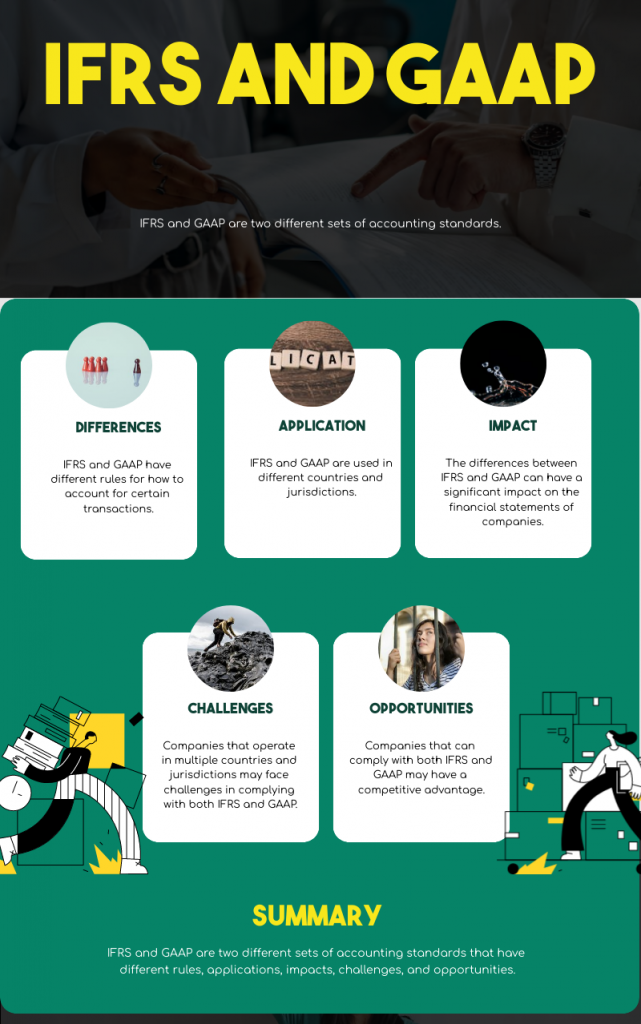
The Impact of IFRS and GAAP on Real Estate Fund Accounting
- February 20, 2024
- OHI

When diving into the world of real estate fund accounting, two big names you often hear are IFRS and GAAP. These might sound like complicated financial terms, but they’re actually just sets of guidelines that help companies, including those in real estate, explain how they’re doing financially. Think of them as different recipe books for preparing financial reports – each has its own way of measuring and presenting the success of a business.
In this blog, we’re going to simplify these concepts and explore how they impact real estate fund accounting. Real estate funds are pools of money specifically used for investing in properties, and how they report their financial health can vary based on whether they use IFRS or GAAP guidelines. This variation can make a big difference in how the funds look on paper – affecting everything from their profits to their overall value.
Understanding these differences is crucial, especially if you’re an investor or part of a company dealing with real estate. The way these funds report their numbers can influence important decisions like where to invest and how to manage assets. So, let’s embark on a journey to demystify IFRS and GAAP and their roles in shaping the financial landscape of real estate funds.
Why is this important in real estate? Well, imagine a big pool of money that’s used to buy and manage properties – that’s your real estate fund. How this fund reports its financial health, like how much money it’s making or how valuable its properties are, can be quite different under IFRS and GAAP. This difference can affect everything from how attractive the fund looks to investors, to decisions about buying or selling properties. In this guide, we’ll explore how these two sets of rules impact real estate fund accounting and why it’s something worth understanding for anyone involved in property investment.
IFRS, governed by the International Accounting Standards Board (IASB), is a global framework that aims to bring transparency, accountability, and efficiency to financial markets. Adopted in over 140 jurisdictions, its principles-based approach offers some flexibility, allowing for interpretation based on the nature of transactions.
GAAP, primarily used in the United States, is a rule-based framework developed by the Financial Accounting Standards Board (FASB) and the Governmental Accounting Standards Board (GASB). It focuses on standardizing financial reporting to ensure consistency and comparability across entities.

The impact of IFRS (International Financial Reporting Standards) and GAAP (Generally Accepted Accounting Principles) on financial reporting and performance metrics in real estate fund accounting is significant and multifaceted. These accounting standards determine how a real estate fund’s financial health and performance are measured and reported, influencing key decisions made by investors and fund managers. Let’s break down this impact into simpler terms.
Accounting standards play a pivotal role in shaping investor perceptions. IFRS’s fair value model, with its potential for volatility, may appeal to certain investors seeking dynamic market reflection, while GAAP’s stability in valuation might attract long-term investors. The choice of accounting standard can significantly influence investment decisions.
Compliance with either IFRS or GAAP entails distinct challenges. The operational costs, complexity of financial reporting, and the need for specialized expertise vary, impacting how real estate funds manage their accounting practices.
Cross-border investments, where funds and investors engage in real estate transactions across different countries, come with their unique set of challenges, especially when navigating between IFRS and GAAP accounting standards. These challenges significantly impact how investment opportunities are assessed and managed. Let’s delve into some of these key challenges:
The ongoing debate between convergence and divergence of these standards is pivotal for the future of international real estate fund accounting. A converged global standard could simplify cross-border transactions and comparisons, but it also requires reconciling fundamentally different approaches to accounting.
In the intricate realm of real estate fund accounting, the roles of International Financial Reporting Standards (IFRS) and Generally Accepted Accounting Principles (GAAP) are both critical and distinctive. Their impact stretches far beyond mere compliance, influencing financial transparency, investor confidence, and the overall strategic decisions within the real estate sector.
The choice between IFRS and GAAP is not just a technical accounting preference, but a strategic decision that can shape a fund’s financial narrative. IFRS, with its fair value approach, offers a dynamic reflection of the market, making it appealing for those who favor current market conditions in their reporting. On the other hand, GAAP, with its emphasis on historical cost and structured revenue recognition, provides a sense of stability and consistency, particularly beneficial for long-term investment strategies.
In conclusion, the impact of IFRS and GAAP on real estate fund accounting is profound and far-reaching. Understanding and effectively navigating these standards is crucial for anyone involved in the real estate investment arena. As the industry evolves, so too will these accounting frameworks, continuing to shape the landscape of real estate fund accounting in the years to come.
Contact us for a customized NO OBLIGATION proposal for outsourcing your accounting activities.









